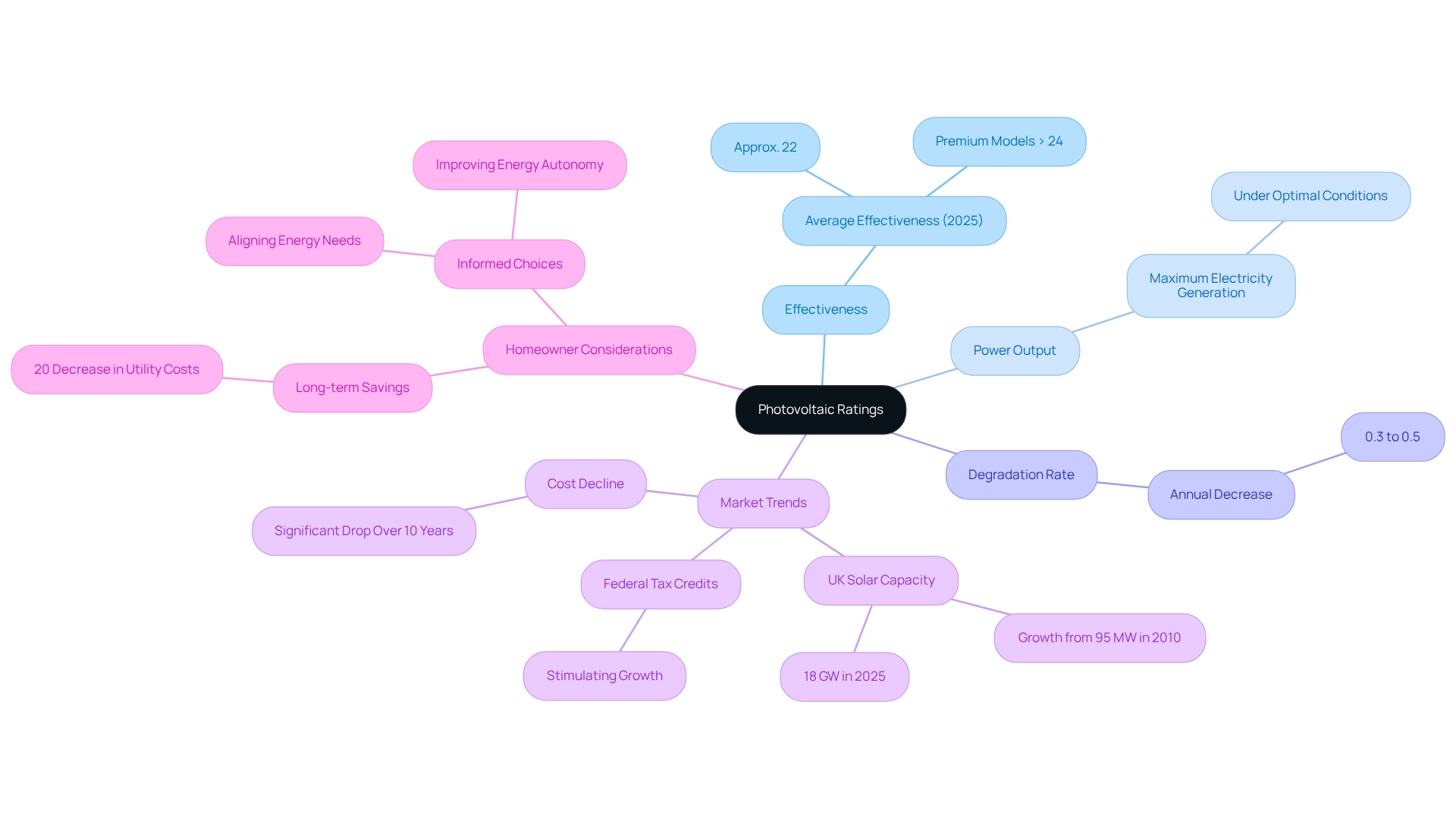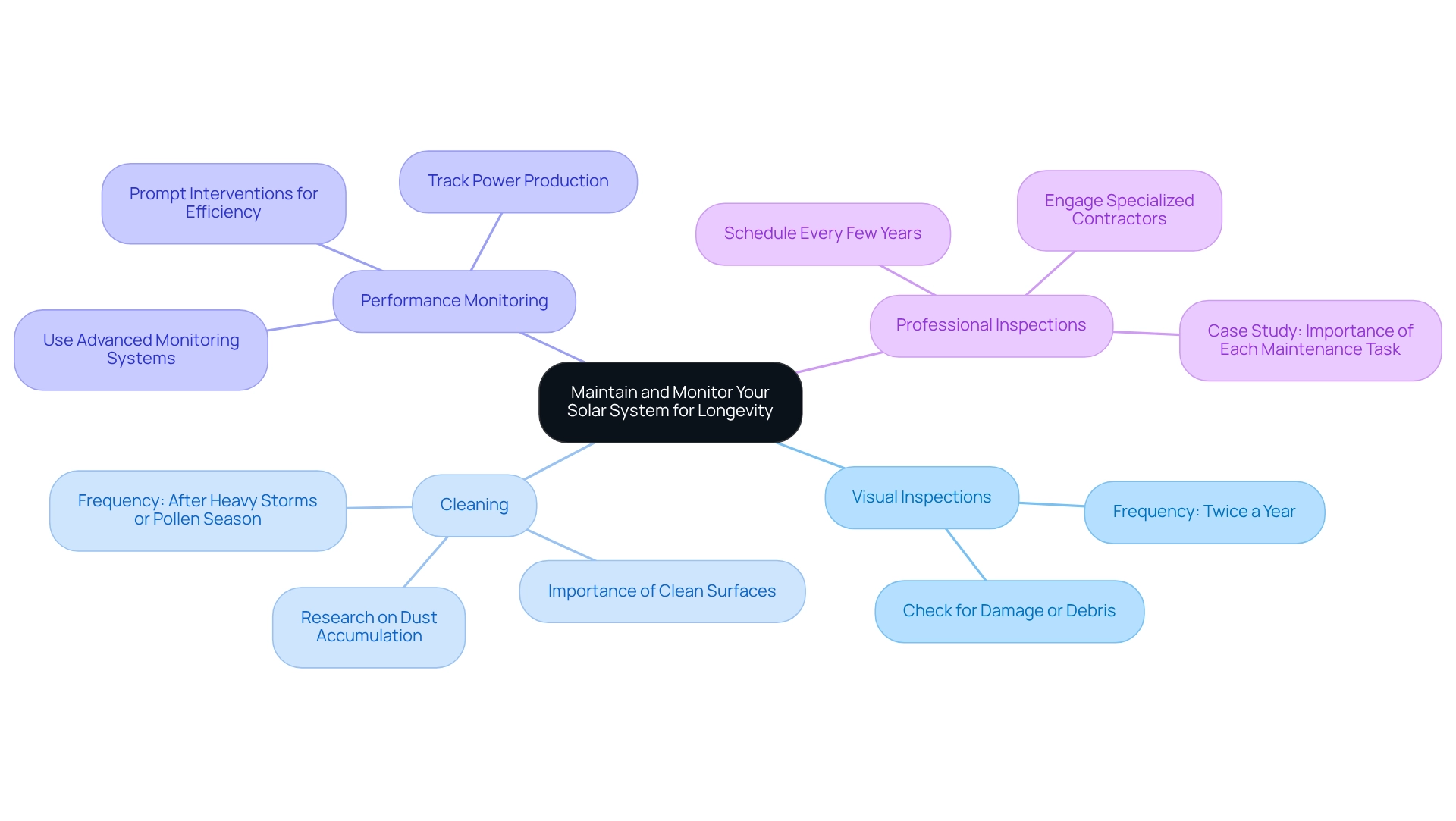Overview
We understand that rising energy bills can be a significant concern for homeowners. To address these worries, consider adopting strategies that can improve the solar rating for your house. By:
- Optimizing panel orientation
- Ensuring regular maintenance
- Investing in high-quality solar products
You can not only enhance your energy efficiency but also experience the joy of energy independence. These actions lead to substantial long-term savings on utility bills, supporting a more sustainable energy future for all of us. Together, we can work towards a solution that not only benefits your home but also contributes to a healthier planet. Let’s take this journey towards energy efficiency and savings together.
Introduction
As we navigate the rising costs of energy bills, many homeowners are seeking sustainable solutions that not only alleviate financial strain but also contribute to a healthier planet. Solar power emerges as a beacon of hope and innovation, offering a pathway to energy independence. With technology advancing rapidly, making solar energy more efficient and affordable, it becomes crucial to understand the nuances of solar ratings.
We know that evaluating key metrics like efficiency and power output can feel overwhelming. However, by implementing effective strategies to enhance solar performance, you can transform your energy consumption and significantly reduce costs. This article will explore the critical factors that influence solar ratings, share effective strategies to boost efficiency, and highlight the importance of selecting high-quality products. Together, we can empower you to make informed decisions on your journey towards energy independence, ensuring that you feel supported every step of the way.
Understand Solar Ratings: Key Factors and Metrics
Understand Photovoltaic Ratings: Key Factors and Metrics
We understand that navigating the world of energy bills can be daunting. Photovoltaic ratings are influenced by several critical factors, including effectiveness, power output, and degradation rate:
- Effectiveness: This measures the percentage of sunlight converted into usable electricity.
- Power Output: This indicates the maximum electricity a panel can generate under optimal conditions.
- Degradation Rate: This reflects how much a panel’s effectiveness diminishes over time, typically ranging from 0.3% to 0.5% annually for high-quality panels.
In 2025, the average effectiveness of photovoltaic panels has reached approximately 22%, with some premium models exceeding 24%. This enhancement in productivity is a consequence of progress in photovoltaic technology and manufacturing methods, which have almost doubled worldwide PV cell production capability since 2023. Significantly, the UK’s installed photovoltaic capacity has reached 18 GW in 2025, emphasizing the worldwide increase in renewable source adoption, and understanding these metrics is vital for homeowners to effectively evaluate the solar rating for my house and compare different renewable products.
For instance, while modules with superior performance ratings may require a larger upfront cost, they frequently provide more significant long-term savings on utility bills. Have you considered how much you could save? A case analysis on panel efficiency comparisons showed that homeowners who selected high-efficiency panels saw a 20% decrease in utility costs over five years compared to those who picked standard models.
Furthermore, recent advancements in panel ratings have emphasized the significance of considering both efficiency and power output degradation rates when choosing panels. The expenses of photovoltaic systems have significantly dropped over the past ten years, making renewable power more attainable and economically feasible for homeowners. Moreover, federal tax credits are anticipated to encourage growth in renewable energy investments, offering additional financial incentives for embracing alternative energy solutions.
By assessing these elements, including perspectives from local energy firms in Stockton, we can work together to make informed choices that align with your energy requirements and financial objectives, ultimately improving your energy autonomy and sustainability, particularly in relation to the solar rating for my house.
Implement Effective Strategies to Boost Solar Efficiency
Are you feeling overwhelmed by rising energy bills? We understand how concerning this can be. To enhance the solar rating for my house and ease your worries, homeowners can adopt several nurturing tactics:
- Optimize Array Orientation: Position your energy collectors to face true south, ideally at an angle between 20 and 45 degrees. This simple adjustment can maximize light exposure throughout the day, which can improve the solar rating for my house and help you harness the sun’s power more effectively.
- Regular Maintenance: It’s essential to arrange routine cleaning of your solar panels. Removing dirt and debris ensures optimal sunlight absorption. Consistent upkeep is vital for preserving efficiency, and Powercore Electric offers expert panel maintenance services to ensure a high solar rating for my house.
- Monitor Performance: Utilizing monitoring tools can help you track power production, allowing for quick identification of any performance issues. This proactive approach empowers you to stay on top of your energy needs by considering the solar rating for my house.
- Power Storage Solutions: Consider investing in battery storage systems to capture sunlight during peak demand periods to improve the solar rating for my house. This can significantly decrease your dependence on the grid, providing you with greater energy independence as indicated by the solar rating for my house. The top battery choices, featuring high performance ratings and advanced functionalities, can greatly enhance your energy storage effectiveness.
Furthermore, it’s important to recognize that the expense of residential photovoltaic panel systems decreased an impressive 64 percent from 2010 to 2020. This makes solar energy solutions more economical than ever, which is essential for achieving a good solar rating for my house and paving the way for a sustainable future.
- Complimentary Energy Assessment: Take the first step towards enhanced energy performance by securing a complimentary assessment from Powercore Electric. This assessment can provide insights into possible savings and system alternatives tailored to the solar rating for my house. By implementing these strategies, you can significantly enhance the solar rating for my house, resulting in increased savings and a more sustainable energy future. Moreover, selecting premium energy products, such as Canadian Solar modules with a remarkable 22.5% efficiency rating, can greatly influence the solar rating for my house and improve overall effectiveness and savings.
Creative cleaning technologies, including automated cleaning robots and self-cleaning coatings, can also streamline the upkeep process, ensuring your energy collectors remain efficient and effective. Together, let’s work towards a brighter, more sustainable future for your home.
Choose High-Quality Solar Products and Technologies
As homeowners, we often find ourselves grappling with rising energy bills, which can be a source of stress. When considering renewable energy products, it’s essential to prioritize high-quality modules and inverters from reliable manufacturers, especially those that perform well even on overcast days. Look for photovoltaic modules that boast a minimum performance rating of 20%. Most home setups today utilize monocrystalline panels, celebrated for their outstanding output. As Daniel Ciolkosz, a professor of Agricultural and Biological Engineering at Pennsylvania State University, wisely points out, “It’s just one part of the equation,” reminding us of the intricate nature of systems that harness sunlight.
A warranty of at least 25 years is crucial for ensuring long-term reliability, providing you with peace of mind. Equally important is the inverter’s efficiency, as it directly influences how effectively sunlight is converted into usable electricity. Leading brands like SunPower and LG are recognized for their high-quality energy panels, while SolarEdge and Enphase are noted for their efficient inverters. Additionally, JA Solar offers a diverse selection of energy products that are worth your consideration.
Investing in these reliable products not only enhances system performance but also assures you of durability and efficiency over time. We understand that navigating this landscape can feel overwhelming, which is why we encourage you to obtain multiple quotes from various installation professionals. Local experts like Powercore Electric are known for their exceptional service and community involvement, ensuring that you make informed decisions tailored to your specific power requirements and service quality.
Ultimately, choosing high-quality energy products can improve the solar rating for my house, leading to enhanced energy efficiency and long-term cost savings. Together, we can work towards a more sustainable future, empowering you with the tools to achieve energy independence.
Maintain and Monitor Your Solar System for Longevity
To ensure the longevity of your solar system, it’s important to establish a regular maintenance schedule that encompasses key practices designed to protect your investment and enhance your energy independence.
- Visual Inspections: We understand that noticing issues early can be a source of peace of mind. Perform examinations for noticeable harm or debris on the surfaces at least twice a year. This proactive approach helps identify potential issues early, safeguarding your investment.
- Cleaning: Keeping your solar panels clean is essential for optimal energy production. Clean the surfaces as necessary, particularly after heavy storms or during pollen season. Over time, dust, dirt, and debris can accumulate, blocking sunlight and hindering performance. Researchers from the Indian Institute of Engineering Science and Technology have developed a model to estimate dust accumulation on solar panels, which can help determine cleaning frequency based on local conditions. Regular cleaning can significantly enhance efficiency and reduce the median loss rate of photovoltaic systems, which averages 0.75% per year.
- Performance Monitoring: It’s common to feel uncertain about the efficiency of your solar system. Utilize advanced monitoring systems to track power production and detect any drops in performance. As Gaurav Singh from Fenice Energy mentions, “monitoring the performance of modules can conserve a significant amount of power.” This enables prompt interventions, ensuring your system functions at optimal performance.
- Professional Inspections: To further alleviate concerns, schedule professional inspections every few years to verify that all components are functioning correctly. Engaging specialized contractors for maintenance tasks, such as cleaning and repairs, can prevent significant issues and enhance overall performance. A case study titled ‘Importance of Each Maintenance Task’ emphasizes that regular maintenance activities, such as cleaning, inspecting, and repairing energy units, are essential for maximizing energy savings and ensuring reliability.
By following these maintenance practices, you can optimize your energy system’s efficiency and longevity. Statistics suggest that photovoltaic systems generally possess a lifespan of 25-30 years, and routine upkeep is essential for safeguarding this investment. Additionally, environmental factors, such as particulate matter concentration and weather conditions, can affect solar panel performance, indicating that some locations may require more frequent maintenance. Together, by implementing these practices, you not only extend the longevity of your systems but also enjoy substantial energy savings over time.
Conclusion
The journey towards energy independence through solar power is not just empowering; it is essential in today’s climate-conscious world. We understand that many homeowners are concerned about rising energy bills and the impact on their finances. By grasping the key factors that influence solar ratings—such as efficiency, power output, and degradation rates—you can make informed decisions that truly align with your energy needs and financial goals. Researching local solar companies and comparing product specifications can lead to significant long-term savings, especially when you choose high-quality solar products.
Implementing effective strategies to boost solar efficiency, such as optimizing panel orientation and scheduling regular maintenance, can further enhance the benefits of your solar energy system. By monitoring performance and investing in energy storage solutions, you can take control of your energy consumption, ensuring you maximize the use of your solar energy. As the costs of solar technology continue to decline, the opportunity for substantial financial savings becomes even more compelling.
Ultimately, by selecting high-quality solar products and committing to regular maintenance, you can ensure a sustainable and financially advantageous solar solution. By prioritizing durability and efficiency, you not only contribute to a healthier planet but also secure a reliable energy future for yourself and your family. As the solar industry evolves, embracing these practices will empower you to lead the charge towards energy independence, making a lasting impact on your life and the environment. Together, we can create a brighter, more sustainable future.




